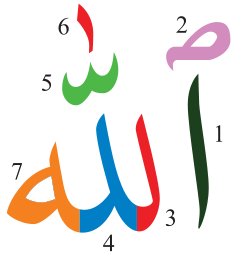1. Tawhid: The Oneness of Allah :
Tawhid is the belief in the absolute oneness of Allah, a core concept that distinguishes Islam as a
monotheistic faith.
Tawhid al-Rububiyyah :
The belief in Allah as the sole Creator, Sustainer, and Controller of the
universe.
Tawhid al-Uluhiyyah :
The belief that Allah is the only one worthy of worship, and that all acts of
worship must be directed to Him alone.
Tawhid al-Asma wa Sifat :
The belief in the names and attributes of Allah, affirming that He possesses
the most perfect and beautiful qualities.
The Shahada or declaration of faith expresses this belief: "La ilaha illallah, Muhammadur
Rasulullah"—"There is no god but Allah, and Muhammad is the Messenger of Allah".
2. Names and Attributes of Allah :
Allah is known by 99 names (Asma’ul Husna), each reflecting a different aspect of His nature. These
names are mentioned throughout the Quran and the Hadith (sayings of the Prophet Muhammad, peace be upon
him). They help believers understand Allah’s qualities and deepen their connection with Him.
Some of the most significant names include :
Ar-Rahman (The Most Merciful) and Ar-Raheem (The Most Compassionate): These names emphasize Allah’s
infinite mercy and compassion toward His creation.
Al-Khaliq (The Creator) :
Allah is the creator of the heavens, the earth, and all that exists within
them.
Al-Malik (The King) :
This signifies Allah's absolute sovereignty over the universe.
Al-‘Alim (The All-Knowing) :
Allah possesses complete knowledge of everything, past, present, and future.
As-Sami’ (The All-Hearing) and Al-Basir (The All-Seeing): He hears and sees all things without
limitation.
Al-Adl (The Just) :
Allah is fair and just in all His actions and decisions.
Al-Ghafoor (The Forgiving) :
Allah forgives those who sincerely repent and seek His mercy.
The 99 names represent only a portion of His qualities, as His knowledge and nature are beyond complete
human comprehension.
3. Role of Allah in the Quran :
The Quran, Islam’s holy book, is considered the literal word of Allah as revealed to the Prophet
Muhammad (peace be upon him) through the angel Gabriel (Jibril) over 23 years.
Allah speaks directly to humanity in the Quran, providing guidance for belief, worship, ethics, and law.
The Quran emphasizes Allah’s oneness, mercy, wisdom, and power, reminding believers of their purpose to
worship Him and live according to His commandments.
Examples of key verses about Allah include :
Surah Al-Ikhlas (Chapter 112) :
A chapter dedicated to describing the nature of Allah:
"Say, He is Allah, [who is] One, Allah, the Eternal Refuge. He neither begets nor is born, Nor is there
to Him any equivalent."
Ayat Al-Kursi (Surah Al-Baqarah, 2:255) :
A verse that highlights Allah’s sovereignty, knowledge, and
protection.
"Allah—there is no deity except Him, the Ever-Living, the Sustainer of [all] existence."
4. Allah’s Relationship with Humanity :
Creator and Sustainer :
Allah is believed to have created all human beings, giving them life and the
ability to distinguish between right and wrong. He sustains their lives, provides their needs, and is
the ultimate source of all blessings.
Guide and Judge :
Allah is the ultimate guide, sending prophets like Adam, Noah, Abraham, Moses, Jesus,
and Muhammad (peace be upon them) to convey His message. He provided holy scriptures such as the Torah,
Psalms, Gospel, and the Quran to guide humanity.
Accountability and Judgment :
In Islamic belief, Allah will judge every individual based on their deeds
on the Day of Judgment. Those who follow His guidance and worship Him alone will be rewarded with
Paradise (Jannah), while those who reject Him and commit evil deeds will face punishment in Hell
(Jahannam).
5. Acts of Worship and Connection with Allah
Muslims express their devotion to Allah through various acts of worship :
Salah (Prayer) :
Muslims perform five daily prayers facing the Kaaba in Mecca, reinforcing their
submission to Allah.
Dua (Supplication) :
Muslims communicate with Allah directly through personal prayers, seeking His help,
guidance, and forgiveness.
Fasting (Sawm) during Ramadan :
Fasting is a means of attaining spiritual closeness to Allah and
increasing self-discipline.
Zakat (Charity) :
Muslims give a portion of their wealth to those in need, as a form of gratitude to
Allah for His provisions.
Hajj (Pilgrimage) :
Performing the Hajj pilgrimage to Mecca is an obligation for Muslims who are able,
serving as a demonstration of unity and devotion to Allah.
6. Belief in the Attributes of Allah :
Muslims believe that Allah’s attributes are incomparable to any of His creation, emphasizing His
transcendence.
Transcendence (Tanzih) :
Allah is beyond the physical world and cannot be likened to anything in
creation. "There is nothing like unto Him." (Quran, Surah Ash-Shura, 42:11).
Immanence (Taqarrub) :
Despite being beyond human comprehension, Allah is close to His creation, aware of
their thoughts and feelings. "We are closer to him than [his] jugular vein." (Quran, Surah Qaf, 50:16).
7. The Role of Allah in Islamic Creed (Aqidah) :
Belief in Allah is the first of the Six Articles of Faith in Islam, which also include belief in angels,
prophets, holy books, Day of Judgment, and divine decree (Qadar).
Understanding Allah’s nature and attributes is considered fundamental to a Muslim’s belief system and
shapes their relationship with the world and moral conduct.
Conclusion :
Allah is the central focus of a Muslim’s life, embodying the principles of monotheism, compassion,
justice, and mercy. His oneness is the core message of Islam, and through His 99 names and attributes,
Muslims learn about His infinite qualities. The relationship between Allah and humanity is characterized
by worship, guidance, and ultimate accountability, emphasizing the need for sincerity in worship and
adherence to His commands. Understanding and reflecting upon the nature of Allah inspires Muslims to
live with faith, hope, and a sense of purpose in fulfilling their role as His servants.



